As a hotelier, you must understand that the only way to attract modern travelers is to focus on online sales across numerous travel markets, not just your own website. And that’s a lot of manual, time-consuming work for one person. How to make inventory distribution smooth and stress-free? With channel management software.
We’ve already discussed APIs and services for custom channel management. This time, we contacted specialists from Cloudbeds, SiteMinder, and eZee Technosys to discuss the channel management functionality you need and how to find a solution that suits you.
What is a hotel channel manager?
A channel manager is a software tool that enables achieving multichannel inventory distribution with instant updates of prices and availability. In other words, it allows you to simultaneously sell your inventory across multiple websites and provide customers with actual information on prices and property occupancy.
A channel manager can be a stand-alone solution or part of a hotel’s property management system (PMS) or central reservation system (CRS).
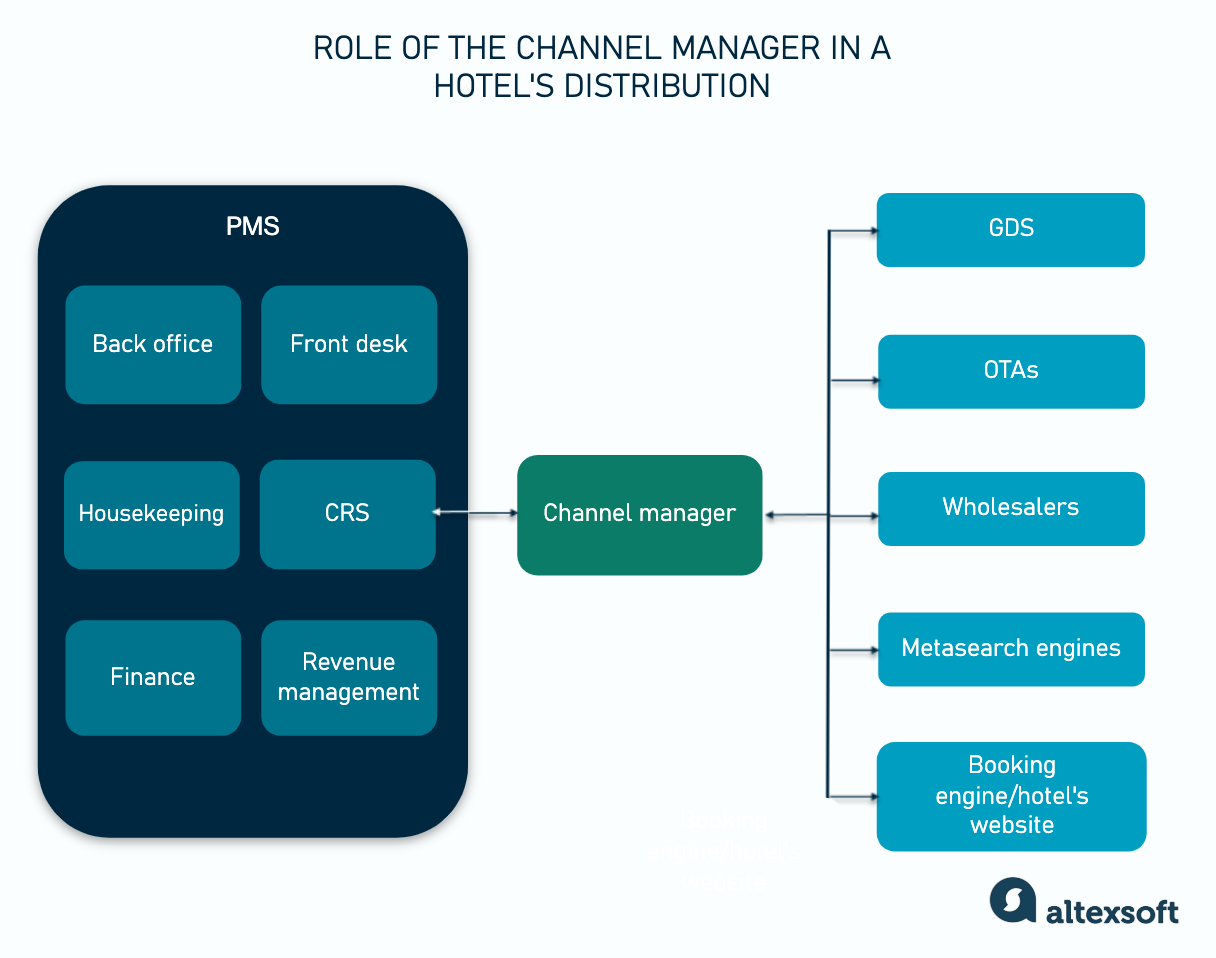
A channel manager’s function related to a property management system
If you’re new to hotel distribution and the way connectivity is achieved in the hospitality industry, we have a comprehensive article on the main travel APIs as well as a video explainer to provide you with an overview. Skip it if you are looking for deeper insights into channel management.
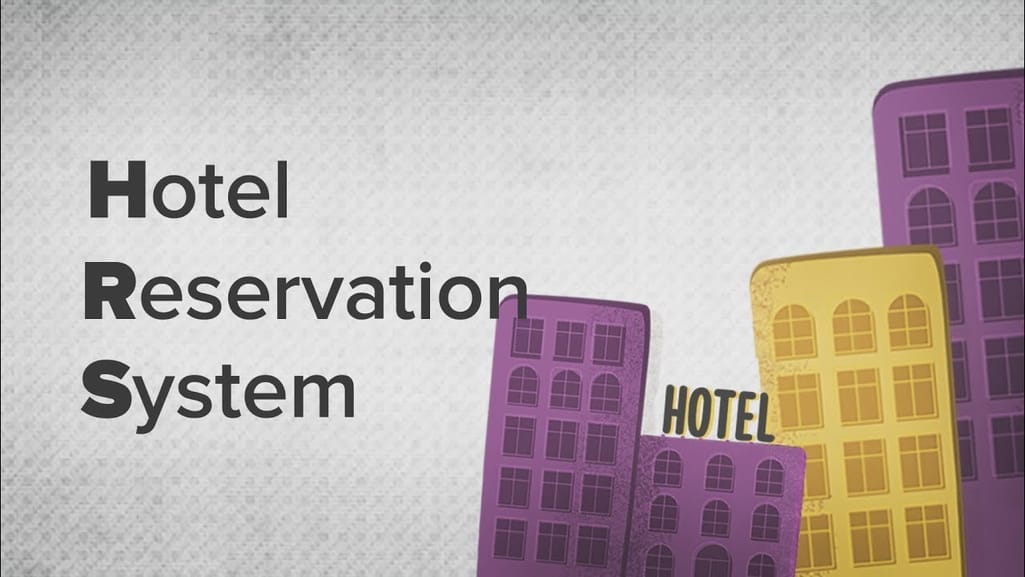
Hotel booking systems explained
Now, why would a hotel need a channel manager?
Benefits of channel management
So, there are three main reasons why property owners use channel managers: managing distribution, ensuring consistency across channels, and providing analytics. Let’s take a closer look at each of them.
Managing distribution across multiple channels
Needless to say, managing and diversifying the hotel’s distribution is crucial as promoting your property through a variety of channels increases visibility, drives occupancy, and consequently, boosts profit. Developing a successful distribution strategy is about choosing the right number and mix of channels.
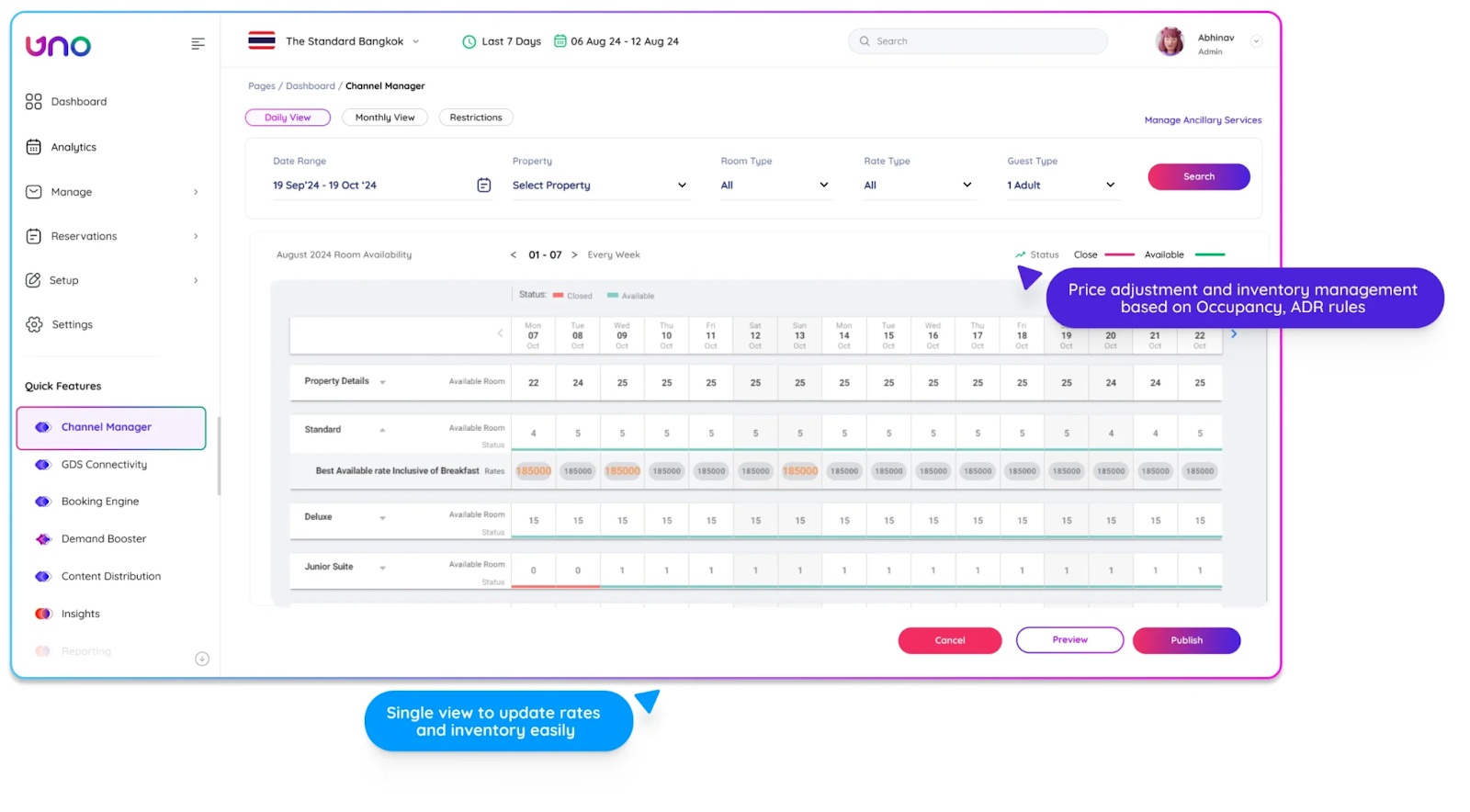
Single view of your distribution channels. Source: Uno
There are multiple channels available for hotels to distribute their inventory.
An Online Travel Agency, or OTA, is an online platform that gives travel consumers access to various travel products and services. It’s one of the main distribution channels for hotels, as millions of travelers use OTA websites like Expedia or Booking.com to arrange their travel due to huge marketing investments made by these companies.
Learn more about how to grow OTAs in a dedicated article.
Becoming increasingly popular, vacation rental listings such as Airbnb and Vrbo operate in a similar way, charging property owners a monthly fee or a fee per booking. The difference is that they often also charge guests and mostly deal with short-term rentals or shared-space accommodations.
A Global Distribution System, or GDS, is a worldwide network that connects travel service providers (hotels, airlines, car rental companies, etc.) to travel agencies. The three major ones are Sabre, Amadeus, and Travelport. Each GDS aggregates inventory, rates, and schedules information from the providers and allows travel agents to book their services. This channel can help promote your inventory globally and attract corporate travelers.
Here’s an article for more information on how to choose between three major GDSs.
Metasearch platforms such as Google, Kayak, or Tripadvisor make your property visible to travelers who conduct general inquiry searches. Such websites present consumers with a list of options and either redirect them to the hotels’ websites to complete a reservation or enable direct booking.
Wholesalers, or bed banks, buy hotel rooms in bulk at discounted rates for resale.
We have an article about the major bed banks and how they operate.
Social media and the hotel’s own website are the primary channels for direct bookings. An integrated booking engine allows travelers to manage their reservations directly. To maximize the performance of this channel, you have to develop an attractive mobile-friendly design, invest in online advertising, and consider SEO practices to increase ranking.
Here's how Gregor Vogel, Vice President of Product at SiteMinder, defines the role of channel management software:
“At its core, a channel manager creates a two-way connection between a hotel’s property management system and that hotel’s chosen marketing and sales channels, be they online travel agencies (OTAs) like Expedia, metasearch sites like Trivago, wholesalers, tour operators, travel agents, and even their own hotel Brand.com website. It literally connects the hotel’s PMS to those channels, so property owners can instantly and simultaneously distribute all their rooms on the Internet, and have reservations delivered back to them just as fast.”
Cloudbeds specialists in their Big Book of OTAs note that channel managers can simplify and speed up the connection with third-party websites, which may “take days-long to complete.”
Consistency throughout the chosen channels
As a reservation may be made at any moment, a hotel must ensure that rates and availability information are up-to-date on each of these sites. The more channels accommodation providers use, the more difficult it is to manually track reservations and update prices and calendars.
“The real-time syncing and delivery of information means, as a property owner, you know the room rates and availability that you have displayed online are always the most current, so you can increase your chances of getting booked and therefore grow your revenue,” continues Gregor Vogel.
Thanks to real-time updates of availability and price data, hospitality entrepreneurs can easily forget about the embarrassment of overbooking: “It also means you can eliminate your chances of getting double booked or overbooked, so you no longer have to worry about time lags and human error or be in the awkward position of telling your guest upon arrival that you don’t have a room available for them.”
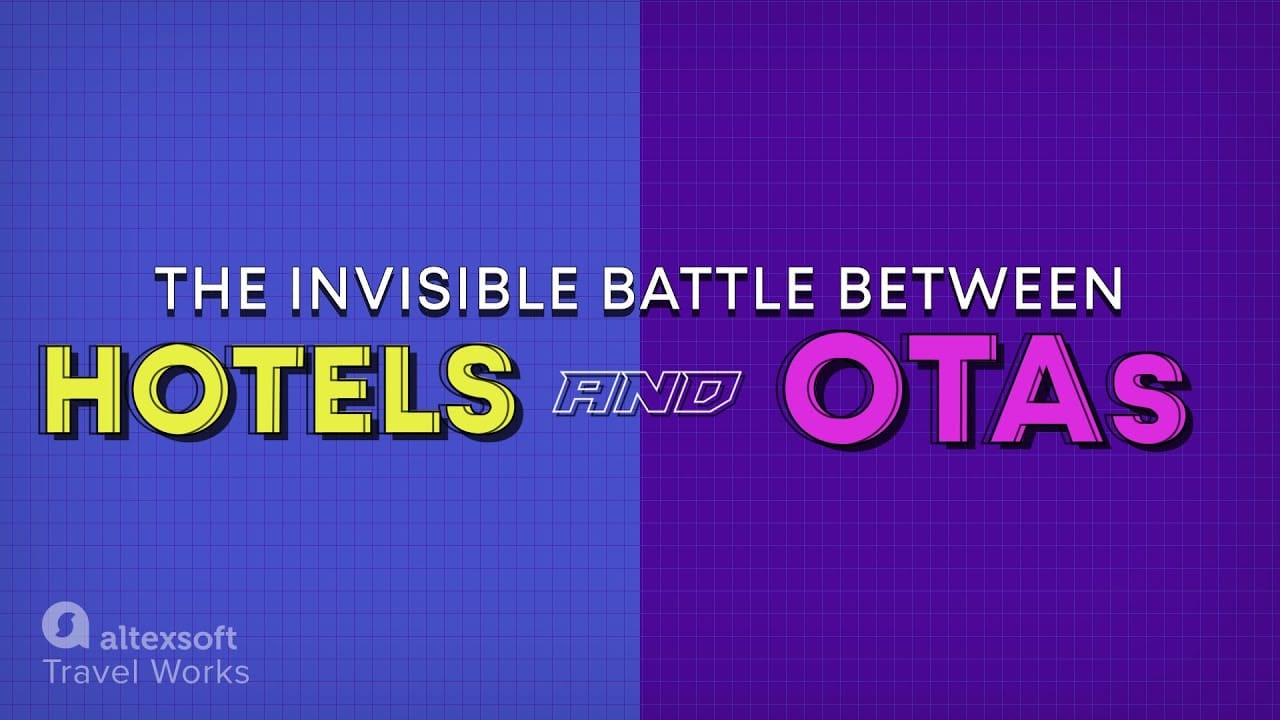

The complex relationship between hotels and OTAs, explained
Another benefit of a channel manager is that it helps avoid rate parity issues. Rate parity is about keeping a consistent price across all distribution channels. This way, OTAs make sure that hotels don’t offer discounts to drive direct bookings. Channel managers allow you to manage rates throughout the sales channels simultaneously or separately.
Analyzing data and creating reports
Every channel manager provides analytics and reporting. The software collects and maintains booking data across all channels and presents it in charts, diagrams, and other graphical forms. Property owners can access information on occupancy, reservations, or revenue for a specific period at any time. That way, they can define high- and low-performing channels and adjust their distribution strategy.
Eventually, this software is a time-saver. Hoteliers can focus on making guests feel comfortable in their temporary home.
“The job of hoteliers is incredibly demanding these days. Not only are they expected to be experts in hospitality; they’re expected to be experts in revenue management, online reviews, social media, and everything in between, all while having to tend to the guest standing in front of them asking for a new set of towels. By automating an otherwise tedious and costly process of updating several extranets manually, a channel manager can give hoteliers countless hours back in their day, so they can focus on their guests rather than technology,” concludes Gregor Vogel.
How to choose a channel manager? Features and aspects to consider
Before we talk about the products that exist on the market, let’s discuss the main points to be considered when you choose a channel manager product for your hospitality business.
Define optimal channel mix
The first aspect lies on the surface. Since you need a channel manager to increase your online visibility and welcome more travelers, it must connect with channels that are optimal for your property and the experience you offer.
More importantly, a channel manager should provide quality connections to channels used by the types of guests you’re hoping to attract. “If you’re a hotel looking to attract Chinese travelers, for example, you will want access to the booking channels that Chinese travelers use most, like Ctrip or Fliggy. The makeup of travelers is constantly evolving, so gaining access to these more niche channels, as well as the top global ones, will allow you to broaden your distribution strategy and attract new types of guests,” explains Gregor Vogel from SiteMinder.
It’s not only about big brands, thinks Vice President of Strategic Partnerships at Cloudbeds, Sebastien Leitner. Listings on popular OTAs help accommodation providers drive direct business. But channels catering to a dedicated customer base must not be ignored. “Most hoteliers understand they need to connect to large players such as Booking.com and Expedia. While those players aren’t going anywhere, there is a move towards niche distribution channels that can cater to a property’s unique experiences and customer segments. Hotels that stick to their legacy list of channels will ultimately lose out on incremental revenue and miss an opportunity to meet guests where they are shopping,” says Sebastien.
Ensure fast two-way XML connectivity
A fast connection between a PMS and chosen third-party channels, as well as your booking engine, is one of the must-have features for a modern channel manager, usually realized with the XML data format. Two-way connectivity implies systems continuously exchanging data about rates, bookings, availability, and restrictions.
Using such channel managers, property owners can avoid overbookings and pricing that doesn’t match reservations.
The speed with which a channel manager updates your data is also important, notes Manasi Shah, former team lead of content marketing at eZee Technosys.
“Hotels might receive walk-ins or sudden (unplanned) bookings on a day-to-day basis. In such cases, they need to update their inventory on the channels immediately, as someone might be booking a room that is not actually available (which is what happens during overbookings.. Similarly, selling the right room at the right price at the right time is the key to a hotel's success and revenue growth. Rate updates on the channels, if not done on time, may lead to revenue and booking loss for a hotel. Besides, the hotels’ rankings on OTAs also improve owing to the consistency maintained with the rates and inventory,” adds Manasi.
While in most cases apps or services are connected via APIs, there is also an iCalendar (iCal) format for sharing calendar and scheduling data. It’s a lot more limited than APIs, as it doesn’t allow for exchanging, for example, any pricing information, but can come in handy when the API connectivity can’t be used, or you have too few properties to qualify for some channels. If that’s your case, check if your channel manager provider supports syncing via iCal.
Look for PMS/CRS integration for booking automation and speed
Inventory availability is updated instantly when a channel manager is compatible with your PMS or CRS. That means travelers always see the exact number of vacant rooms, beds, or properties. In turn, you fully use your assets and avoid reservation and pricing errors. So ensure software seamlessly integrates with your current property management system.
It’s also worth providing integration with your revenue management system (RMS) to have full control over rates and effectively manage profit. If such two-way integrations aren't available out of the box, you have to consider partnering with an outside integration provider to set them up for you.
Check whether a system has centralized content management
A well-showcased property is a busy property. A user wants to know everything about a place of interest: policies, interior design, amenities, attractions, etc. A modern channel manager must allow you to edit content across all channels at once.
“Distribution is no longer about syncing inventory and rates,” notes Sebastien Leitner from Cloudbeds. “Richer integrations allow for centralized management of content, which can streamline initial registration/contracting all the way through, ensuring seasonal photos and offers are accurately synced across channels. The ability for distribution technology to seamlessly manage and sync content can save properties’ time and, more importantly, drive reservations.”
Assess analytics and reports capabilities
Informed is forearmed. Opt for a channel manager providing detailed analytics and reporting. Insights into revenue per channel, booking volume, total revenue for a specific period, competitor analysis, or parity rate will help you develop your distribution strategy.
Inquire about security
Hotel reservations deal with such sensitive data as your guests' personal and payment information. Your inner systems (PMS, RMS, booking engine, etc.) as well as distribution partners handle this private data, so it’s important to ensure maximum safety is provided. Ask the channel manager vendor about the connection security and compliance with major standards, such as the Payment Card Industry Data Security Standard (PCI DSS), Strong Customer Authentication (SCA), and General Data Protection Regulation (GDPR).
We discussed what data protection regulations are about and how to comply with GDPR in a dedicated article.
Seek fixed pricing
You’ve researched multiple channel managers, compared their functionality, and bookmarked those that meet your requirements. Now it’s time to estimate how much each of the solutions would cost you. It’s not hard if a vendor offers several pricing plans. But what about additional fees per booking or a percentage of the channel revenue?
Our advice is to consider vendors that offer fixed monthly payment options. The price for each plan depends on a set of functionality and the ability to customize and scale a solution. Most providers also follow a “try before you buy” strategy, allowing you to test each product and decide which one is right for you, whether it has an intuitive interface, integrates seamlessly with marketplaces and systems, and updates travel-related information instantly. Another benefit of a demo version is that you can check whether a customer support team is responsive and professional.
Comparing the best channel managers
Regardless of the type and size of property you manage, you can find software that meets your requirements and needs. As we mentioned earlier, some channel managers are integrated into PMSs or CRSs. At the same time, there are companies providing channel managers as separate products. Let’s take a look at some of the most popular solutions in more detail.
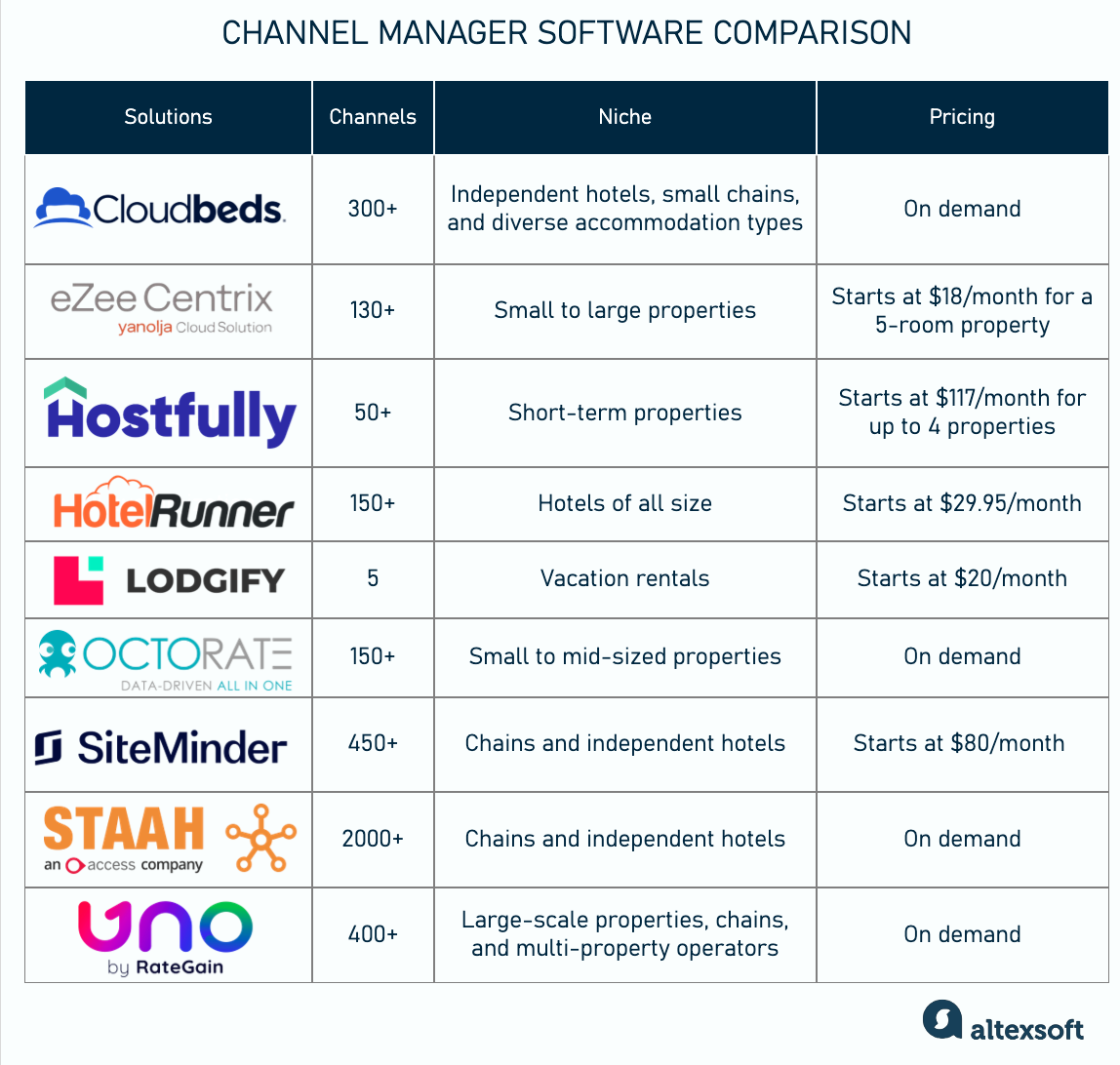
Channel manager software comparison
Cloudbeds Сhannel Manager: mainstream and niche marketplaces for independent hotels
Cloudbeds serves property owners in more than 135 countries, offering a cloud-based hospitality management suite. Their Channel Manager can be used independently or together with Cloudbeds PMS. While designed for small and medium independent properties, hotel groups can also leverage it with additional inventory distribution features.
Integrations & Connectivity:
- 300+ third-party websites, including OTAs and metasearch platforms
- Supports various property types: B&Bs, hostels, hotels, vacation rentals, guest houses, ranches, campgrounds, inns
- Two-way integration with Cloudbeds PMS
Key Features:
- Real-time inventory and rate updates across all channels
- Channel-specific pricing and multi-currency support
- Quick setup for new marketplaces
- Marketplace-specific property information to simplify channel selection
Best for: independent hotels, small chains, and diverse accommodation types that want to reach both mainstream OTAs and niche marketplaces.
Pricing: On demand, depending on property size, location, and features.
eZee Centrix: rich functionality, mobile version, data analysis for various properties
eZee Centrix by eZee Technosys serves properties from small hotels to those with up to 1,000 rooms. It supports a wide range of property types, including hotels, vacation rentals, and larger chains.
Integrations & Connectivity:
- 130+ online channels, including OTAs, GDSs, vacation rentals portals, and metasearch engines
- Third-party PMSs, as well as eZee FrontDesk and Absolute PMS
Key Features:
- Real-time updates of prices and availability to prevent overbookings
- OTA voucher retrieval and booking detail management
- Various delivery options: web and mobile access
- Detailed business insights and analytics, including revenue by channel and a monthly breakdown
- Rate Shopper Tool for competitor rate monitoring and 30-day price forecasting (optional, $4/month)
Best for: small to large properties seeking robust channel management, real-time analytics, and mobile accessibility.
Pricing: Four plans based on property type, room count, and desired features. For example, channel manager features are available for $18/month for a five-room property.
Hostfully: automated vacation rental management
Hostfully offers a channel manager integrated with its property management platform, enabling property managers to sync listings with multiple booking platforms and streamline operations.
Integrations & Connectivity:
- Major OTAs like Airbnb, Vrbo, Booking.com, and Marriott’s Homes & Villas
- 50 additional channels
Key Features:
- Automatic synchronization of property information, pricing, and availability
- Centralized calendar for managing bookings
- Unified inbox for guest communications
- Automated messaging and task management
Best for: property managers seeking an integrated solution for channel management and operational efficiency.
Pricing: The starter pricing for up to 4 properties is $117/month.
HotelRunner: a unified sales and channel management platform
HotelRunner is a comprehensive platform that enables hotels to distribute rooms and manage bookings across OTAs, metasearch engines, and hotels’ own websites, streamlining operations and maximizing revenue.
Integrations & Connectivity:
- 150+ OTAs and metasearch platforms
- Seamless synchronization with property websites
Key Features:
- Centralized calendar for managing rates and availability
- Automated updates to all connected channels
- Unified dashboard for monitoring performance and analytics
- Flexible support for various room types, rate plans, and policies
- Mobile app
Best for: hotels of all sizes looking for an all-in-one distribution and operations platform.
Pricing: The minimum plan featuring a channel manager costs $29.95/month.
Lodgify: vacation rental management and distribution platform
Lodgify is a platform tailored for vacation rentals. Itoffers a channel manager that connects listings to multiple booking platforms, ensuring seamless synchronization of calendars and availability.
Integrations & Connectivity:
- Major platforms like Airbnb, Vrbo, Booking.com, and Expedia
- Sync via iCalfor additional platforms
Key Features:
- Automatic synchronization of calendars across all connected platforms
- Centralized dashboard for managing listings and bookings
- Customizable booking engine for direct reservations
- User-friendly interface for property management
Best for: vacation rental owners and managers looking to streamline their online distribution and booking processes.
Pricing: The starter pricing plan costs $20/month.
Octorate: all-in-one distribution and management for hostels and B&Bs
Octorate is a cloud-based platform designed for boutique hotels, B&Bs, and hostels, offering a comprehensive suite of tools to manage online distribution and sales channels.
Integrations & Connectivity:
- 150+ OTAs and metasearch platforms
- Fully integrated with major property management systems
Key Features:
- Smart calendar for managing rates, availability, restrictions, and reservations
- Real-time updates across all connected channels
- Customizable price and availability transmission to OTAs
- Centralized dashboard to monitor channel status, performance, and income
Best for: mid-sized properties seeking an all-in-one solution for channel management and online distribution.
Pricing: Available upon request; pricing varies based on property size and selected features.
SiteMinder: global reach for hotel chains and indepedent hotels
SiteMinder is a global online hotel marketing and sales company with more than 35,000 hotels using its services and solutions. The company was the first industry player to allow boutique hotels and B&Bs to set a real-time connection between their PMSs and the accommodation sharing platform.
The Channel Manager, one of the products within the SiteMinder platform, is developed for both independent hotels and hotel chains.
Integrations & Connectivity:
- 450+ distribution channels (OTAs, wholesalers, GDSs)
- 350+ two-way PMS/CRS integrations
Key Features:
- Centralized inventory and content management
- Real-time updates across all channels
- Multi-currency, PCI DSS-compliant payments
- Yield and performance reporting dashboards
Best for: chains and independent hotels seeking global reach and robust all-in-one solutions.
Pricing: SiteMinder’s pricing starts at $80 per month, and SiteMinder Plus starts at $110 per month. A 14-day free trial is available.
STAAH: dedicated solutions fo small properties and hotel chains
STAAH serves over 10,000 properties in 90 countries, providing comprehensive channel management solutions. The company has two product versions – Instant and MAX Channel Managers.
Instant Channel Manager supports instant bulk updates of rates and availability via a dashboard. Inventory is sold from a central pool to decrease double bookings. The analytics suite allows users to evaluate how successfully they run their business.
MAX Channel Manager is designed for hotel chains (with its group view, reporting, and centralized management) and comes with revenue management features, particularly up-to-minute market data monitoring for dynamic pricing.
Integrations & Connectivity:
- 2000+ channels, including OTAs, GDSs, payment gateways, and booking systems
- 250+ PMSs
- Compatible with mobile devices via the STAAH Mobile App
Key Features:
- Instant Channel Manager: bulk updates of rates and availability, analytics suite for sales and booking tracking, stop sell limits
- MAX Channel Manager: group view, centralized management, revenue management features, real-time market data monitoring for dynamic pricing
- Mobile app
Best for: Instant is ideal for independent hotels and small properties; MAX suits hotel chains needing centralized management and revenue monitoring.
Pricing: On request.
Uno by RateGain: smart distribution and revenue management
Uno (formerly RezGain) by RateGain is a comprehensive channel management platform that enables properties to distribute rates and inventory effortlessly across 400+ channels in just minutes, enhancing revenue and operational efficiency.
Integrations & Connectivity:
- 400+ distribution channels, including major OTAs, GDSs, and metasearch platforms
- Seamless integration with over 450 systems, including PMS, RMS, and booking engines
- Compatible with mobile devices for on-the-go management
Key Features:
- Real-time updates
- AI rate recommendations based on demand and competitors
- Centralized dashboard
- Content distribution to Sync property details across platforms
- Mobile access
Best for: Large-scale properties, chains, and multi-property operators seeking automated distribution and analytics tools.
Pricing: On request.
Other products to consider
While we haven’t included all products available, let's mention some of less widespread but still decent options as you may also consider checking them.
D-EDGE is a user-friendly tool popular in Europe that offers high-quality connectivity with 300+ distribution channels.
Rentals United is designed particularly for vacation rentals, providing multiple integrations with leading vacation rental listings, metasearch sites, OTAs, etc. It also offers a booking engine, Guest Planner, Guest Communication, and other useful tools.
Lodgable is another niche distribution and channel management software for vacation rental managers/owners that offers its core functionality for free.
Best channel management strategies
Effective channel management goes beyond simply listing rooms on multiple platforms – it requires constant evaluation and optimization. To maximize revenue, hotels should actively monitor channel performance and adjust their strategies based on real-time insights.
Track key metrics. Monitor occupancy rate, average daily rate (ADR), revenue per available room (RevPAR), booking pace, cancellation rates, and other hotel metrics for each channel. Compare KPIs across channels, seasons, and room types to detect trends and anomalies. Take action promptly: reallocate inventory, adjust pricing, or enhance marketing efforts based on the data.
Identify high-performing channels. Channels consistently delivering strong bookings and higher margins should be prioritized. Consider allocating more inventory, promoting packages, or investing in targeted marketing for these platforms.
Spot underperforming partners. Channels with low conversion rates, high commissions, or poor engagement can be optimized or phased out. Evaluate whether issues are due to poor visibility, pricing, or listing content.
Experiment and iterate. Use A/B testing, promotional campaigns, or limited-time offers to see how changes impact performance. Continuously refine strategies based on results.
By actively monitoring performance and adjusting strategies, you can ensure every channel contributes effectively to revenue growth while maintaining optimal occupancy.

